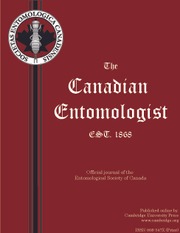Crossref Citations
This article has been cited by the following publications. This list is generated based on data provided by Crossref.
Dove, R. F.
and
McKague, A. B.
1975.
EFFECTS OF INSECT DEVELOPMENTAL INHIBITORS ON ADULT EMERGENCE OF BLACK FLIES (DIPTERA: SIMULIIDAE). II.
The Canadian Entomologist,
Vol. 107,
Issue. 11,
p.
1211.
Granett, J.
Morang, S.
and
Hatch, R.
1978.
Reduced movement of precocious male atlantic salmon parr into sublethal dimilin-G1®1 and carrier concentrations.
Bulletin of Environmental Contamination and Toxicology,
Vol. 19,
Issue. 1,
p.
462.
Mian, Lal S.
and
Mulla, Mir S.
1982.
Residue Reviews.
p.
27.
Singh, M. P.
and
Smith, S. M.
1985.
Emergence of blackflies (Diptera: Simuliidae) from a small forested stream in Ontario.
Hydrobiologia,
Vol. 122,
Issue. 2,
p.
129.
Walsh, J. F.
1985.
The feeding behaviour ofSimuliumlarvae, and the development, testing and monitoring of the use of larvicides, with special reference to the control ofSimulium damnosumTheobald s.l. (Diptera: Simuliidae): a review.
Bulletin of Entomological Research,
Vol. 75,
Issue. 4,
p.
549.
Gothe, R.
and
Morawietz, M.
2010.
Zum Wirkungsspektrum von Juvenoiden in Postembryonalphasen von Argas (Persicargas) walkerae Kaiser und Hoogstraal, 1969.
Zentralblatt für Veterinärmedizin Reihe B,
Vol. 26,
Issue. 10,
p.
779.


